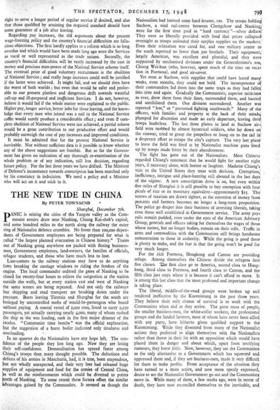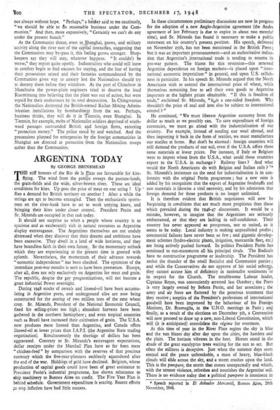THE NEW TIDE IN CHINA
By PETER TOWNSEND Shanghai, December 7th.
PANIC is seizing the cities of the Yangste valley as the Com- munist armies draw near Nanking, Chiang Kai-shek's capital, and some hundred miles to the north along the railway the outer ring of Nationalist defence crumbles. No fewer than too,000 depen- dants of Government employees are being prepared for what is called "the largest planned evacuation in Chinese history." Trains out of Nanking going anywhere are packed with fleeing business- men, Government employees, land-owners, the families of officials, refugee students, and those who have much less to lose.
Late-corners to the railway stations may have to do anything from breaking the carriage windows to riding the fenders of the engine. The local commander ordered the gates of Nanking to be closed for twenty-four hours to relieve the congestion at the station outside the walls, but at every station east and west of Nanking the same scenes are being repeated. And not only the railways but shipping and road transport are breaking down under the pressure. Boats leaving Tientsin and Shanghai for the south are besieged by uncontrolled mobs of would-be-passengers who board without paying. A coastal vessel of 2,000 tons, listed to carry 2,250 passengers, yet actually carrying nearly 4,000, many of whom rushed the ship as she was loading, sank in the first major disaster of the exodus. "Communist time bombs" was the official explanation, but the suggestion of a burst boiler indicated only tiredness and overloading.
In no quarter do the Nationalists have any hope left. The con- fidence of the people they lost long ago. Now they are losing their self-confidence. Demoralisation has spread faster among Chiang's troops than many thought possible. The defections and defeats of his armies in Manchuria, had, it is true, been stupendous, but not wholly unexpected, and their very loss had released huge supplies of equipment and food for the armies of Central China, Ifis well as the reinforcements which could be diverted to points Porth of Nanking. To some extent these factors offset the similar itdvantages gained by the Communists. It seemed as though the
Nationalists had learned some hard lessons, too. The troops holding Suchow, a vital rail-centre between Chengchow and Nanking; were for the first time paid in "hard currency "—silver dollani; They were so liberally provided with food that prices collapsed) overnight as troops unloaded their surplus supplies on the markets.' Even their relaxation was cared for, and one military centre to the south reported no fewer than 300 brothels. Their equipment, largely American, was excellent and plentiful, and they were supported by mechanised divisions under the Generalissimo's son, Chiang Wei-kuo (who, however, spent much of the time on vaca. don in Formosa), and good air-cover.
Yet even at Suchow, with supplies .that could have lasted many weeks, even months, they could not hold. The incompetence of their commanders led them into the same traps as they had falle4 into time and again. Gradually the Communists, superior tactician, as ever, drew them from their lines, surrounded them, and harried and annihilated them. One division surrendered. Another was reported "lost," or "presumed fighting southwards." Many of the officers, with families and property at the back of their mindsj plumped for discretion and made an early departure, leaving thei#1 troops leaderless. The last three planes to land at Suchow air* field were mobbed by almost hysterical soldiers, who lay down on i the runway, tried to grasp the propellers or hung on to the tail in a desperate effort to escape the city's capture. The very last plane' to leave the field was fired at by Nationalist machine guns lined up by troops made bitter by their abandonment.
The fight has gone out of the Nationalists. Most Chinese regarded Chiang's statement that he would fight for another eight years, if necessary alone, with horror or laughter. Madame Chiang's visit to the United States they treat with derision. Corruption,' inefficiency, intrigue and place-hunting still abound in the last days' of the regime. A new conscription drive is on, but even within' .five miles of Shanghai it is still possible to buy exemption with four piculs of rice or its monetary equivalent—approximately $15. The screws of taxation are drawn tighter, as the extortion of money from peasants and farmers becomes no longer a long-term proposition. The police go deeper into their business of arresting liberals, taking even those well established in Government service. The army pay, rolls remain padded, even under the eyes of the American Advisory Group, generals and officers taking for themselves the wages of those whose names, but no longer bodies, remain on their rolls. Traffic in arms and commodities with the Communists still brings handsome remuneration to those in authority. While the going is good there is plenty to make, and the fear is that the going won't be good for very much longer.
For the rich Formosa, Hongkong and Canton are providing refuge. Among themselves the Chinese divide the refugees into five classes. The first class go to America, second class to Hong-' kong, third class to Formosa, and fourth class to Canton, and the fifth class just stays where it is because it can't afford to move. It is among this last class that the most profound and important change is taking place.
The liberal, middle-of-the-road groups were broken up and rendered ineffective by the Kuomintang in the past three years. They believe their only chance of survival is to work with the Communists when and as they arrive. The great mass of people, the smaller business-men, the white-collar workers, the professional groups and the landed farmers, most of whom have never been allied, with any party, have hitherto given qualified support to the Kuomintang. While they dissented from many of the Nationalist actions they preferred to align themselves with the Nationalists rather than throw in their lot with an opposition which would have placed them in danger and about which, apart from terrifying rumours, they knew little. Now, however, they see the Communists as the only alternative to a Government which has squeezed and oppressed them and, if they are business-men, made it very difficult for them to make profits. From acceptance of the situation they have turned to a more active, and now more openly expressed, desire to see the Nationalist Government go out and the Communist move in. While many of them, a few weeks ago, were in terror of death, they have now reconciled themselves to the inevitable, and
not always without hope. "Perhaps," a banker said to me cautiously, "we should be able to 8o reasonable business under the Com- munists." And then, more expansively, "Certainly we can't do any under the present bunch."
As the Communist threat, even to,Ahanghai, grows, and military activity along the river east of the capital intensifies, suggesting that the Communists may by-pass it, this feeling grows stronger. Shop- keepers say they will stay, whatever happens. "It couldn't be worse," they report quite openly. Industrialists who could still leave in comfort begin to find excuses for staying, and the fear of having their possessions seized and their factories commandeered by the Communists gives way to anxiety lest the Nationalists should try to destroy them before they withdraw. At the port of Chinchow in Manchuria the power-plant engineers tried to deceive the local Kuomintang into believing that the plant was out of action, but were repaid for their endeavours by its total destruction. In Chingwantao the Nationalists destroyed the British-owned Kailan Mining Admin- istration installations by bombardment from the sea. Perhaps, business thinks, they will do it in Tientsin, even Shanghai. In Tientsin, for example, mobs of Nationalist soldiers deprived of south- ward passages surrounded British and foreign firms, extorting "protection money." The police stood by and watched. And the precautions planned for eniergencies by the foreign communities in Shanghai are directed at protection from the Nationalists troops rather than the Communists.



































 Previous page
Previous page